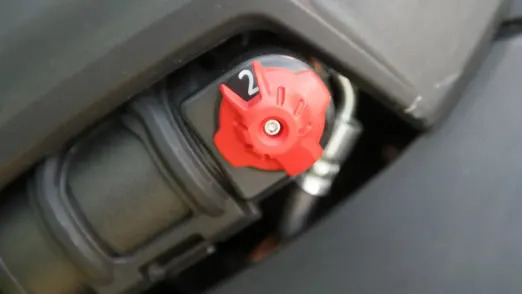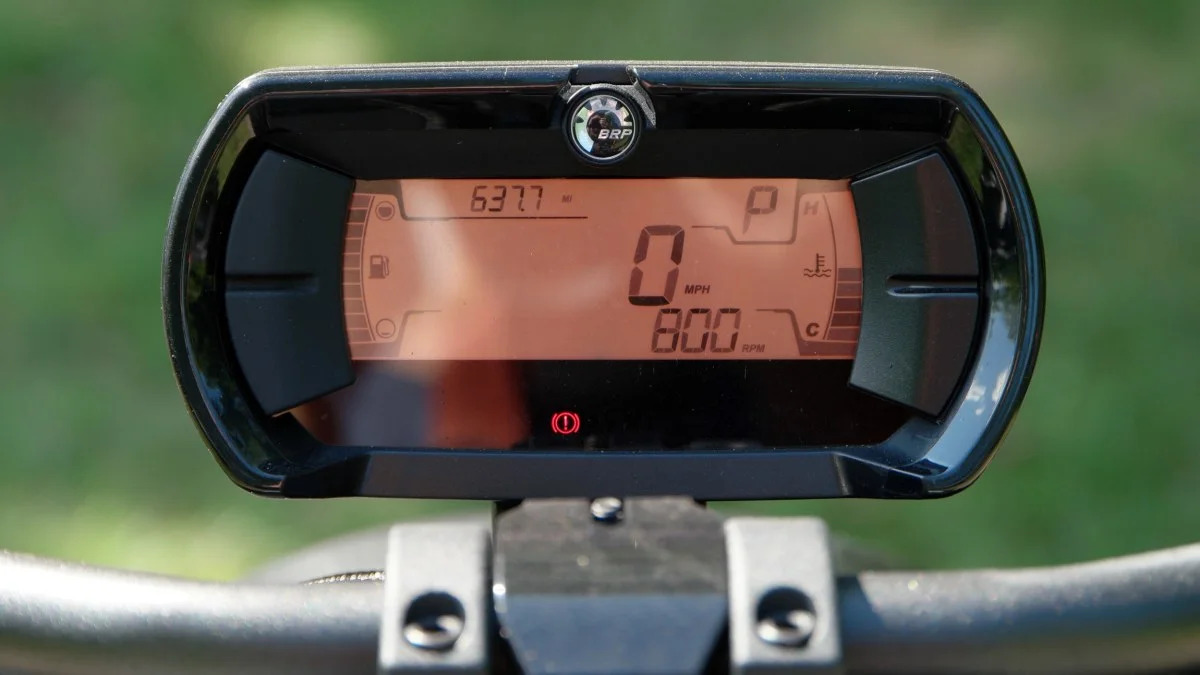Can-Am Ryker Rally Review: Tripedalism on and off the beaten path

The Can-Am Ryker Rally is a conundrum masked as a three-wheeled motorcycle. It looks rad — we wanted to call it a tadpole in mid-frog metamorphosis, but it turns out they get their back legs first — is generally comfortable on the road and quite a bit more capable off-road than we expected. It doesn’t do a single thing better than a more traditional two- or four-wheeler, but it gets close enough in several categories that it’s a worthwhile addition to enough garages to make sense as a viable purchase decision.
But let’s be very clear: The Can-Am Ryker Rally is not a product designed to appeal to everyone. Or even most people. It’s more like a well-aimed dart for a small contingent of the population.
Power comes from a 900cc inline-three engine. It sends 82 horsepower and 58 pound-feet of torque through a continuously variable automatic transmission to the single rear tire, which is sufficient thrust to smoke both the 205/55R15 rear rubber and pretty much all other traffic from a standing stop. The brakes are very powerful, and the anti-lock system, which is activated both front and rear from a single foot-mounted lever, feels confident and secure.
The Ryker Rally is a quick little thing in the city, scooting away from stoplights to 35 miles per hour in true hooligan style. Things slow down drastically from there as the Rally’s CVT settles into its desired rev range, so passing times at highway speeds aren’t anywhere near as impressive as a launch from zero. It’s not slow, but it could certainly use a bit more upper-rpm horsepower. The Akrapovič exhaust system lets out enough of the guttural sounds of the Rotax-supplied engine that it’s still audible even on the highway.
Owners may not want to spend a whole lot of time at highway speeds anyway. While its ergonomics are good — adjustable handlebars and peg positions are certainly helpful here — and the saddle is plenty comfortable, the Ryker’s tripod design doesn’t lend itself well to long and straight stretches of road. It often develops a bit of a wiggle as the two front tires fall into and out of grooves on the asphalt, the sail-like riding position means wind gusts can be disconcerting and require frequent steering correction, and no matter where a bump in the road may lie, it’s often impossible to avoid due to the three contact patches. Steering the Ryker is also a chore that takes strong pressure on the handlebars, and since it doesn’t lean, sweeping corners require that hefty heave for their duration. The faster you go, the more these issues become tiresome. Fortunately, cruise control helps remove one variable from the rider’s brain.

Stick to around-town speeds and most of these complaints are no longer a problem. The suspension — double wishbones up front and a massive single swingarm housing the shaft drive at the rear — boasts KYB shocks that are adjustable in four positions. Loosen the preload and turn down the compression to offer a softer ride and surface imperfections become less likely to bump and jar the Ryker Rally off course. Its abundant low-end torque is perfect for turning pavement into playground.
Perhaps most surprisingly, there’s plenty of fun to be had off the pavement. Keeping the compression damping clicked down, the soft suspension setup works well on bumpy dirt roads. Rally mode, selectable through the digital display directly in front of the rider, allows a much greater degree of slip from the rear than the street-oriented Standard or Sport modes. It doesn’t completely turn traction control off, and ABS programming remains active on the brakes. We found the Rally very entertaining and controllable on loose surfaces, and it’s able to cover ground much more quickly than we’d have guessed. With just under 5 inches of ground clearance, the Ryker Rally is not meant for climbing rocks or traversing muddy trails, but dirt or gravel roads are definitely in play.
An under-trike skid plate is a welcome piece of standard kit. We also appreciate the sweet rally-inspired wheels, intake prefilter, front pushbar and hand guards. Not only do they complete the aggressive look, they’re all functional.
There’s a small trunk at the front of the Ryker, and our test model was also equipped with a single piece of luggage. Neither was large enough to hold a full-face helmet, but we were able to place a large camera up front and a wadded-up jacket and gloves in the side bin. We wouldn’t recommend the Ryker Rally as a vehicle to fully replace a small car, but even a limited amount of storage space is useful. There are quite a few additional storage options available from Can-Am that would make the Ryker more useful for commuters, but we weren’t able to test them.
For riders well accustomed to life on two wheels, the Ryker Rally is going to feel odd at first, and probably eventually limiting. Its acceleration and road-holding performance, while entertaining, are not up to the levels that experienced motorcyclists will demand. It’s not great as a mount to watch the miles stack up in the rearview mirror, and it’s not particularly practical as a daily commuter.

So, who is it for? There’s a sizable portion of the fun-loving population that is averse to life on two wheels, whether due to the need to balance a large bike or because shifting is a difficulty. Some due to physical limitations, others due to fear and uncertainty. All are valid. The Ryker lineup offers such riders a glimpse into the motorcycling lifestyle, and it does so in a much more bike-like package than something like a Polaris Slingshot. To wit, in our experience riders of other motorcycles will wave to someone on a Ryker but not to a Slingshot driver.
The Ryker Rally is also potentially appealing to the small subset of buyers who want to have a little bit of off-pavement chops but need something comparatively comfortable and reliable to get from their driveways to their dirty destinations. It’s not a replacement for a proper dual-sport bike, but it might pull double duty for some riders who might otherwise be looking at a side-by-side UTV but are put off by the lack of street-legal options.
Another part of the Can-Am Ryker Rally’s appeal is its reasonable price. The model line starts at $9,599 with a twin-cylinder 600cc Rotax engine; the larger 900cc engine is optional on this base model. For $12,499 Can-Am offers the Ryker Sport that comes standard with the larger engine and adjustable suspension. The Ryker Rally model we tested comes in at a still acceptable $14,599.
We weren’t expecting the Can-Am Ryker Rally to be as entertaining as it is. It may be limited in scope, and it would not replace a two-wheeled motorcycle in our own fantasy garage, but that doesn’t mean it isn’t fun to ride. Considering the equitable cost of entry, we think the smiles-per-dollar quotient adds up well for would-be buyers looking for a plaything that can pull double duty in town and on the trails.







